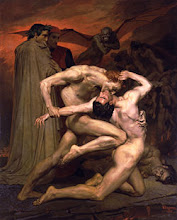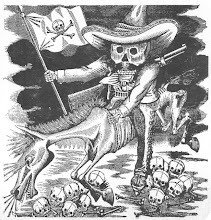Monday, March 31, 2008
There is nothing that fails like success. -- G.K. Chesterton
The immediate impact of reading the book was wrecking my view of history; Tolstoy destroys the Great Man approach to history. I was not completely sold on Great Man histories, even before Tolstoy. I had read enough economic determinism to figure economics was the real driving force. But I did think the big names must have made some difference.
Tolstoy showed that Napoleon, regardless of what he thought he was leading, was just the guy stuck in the front of the mass movement of people from West to East. If anyone had any control of a battle or political victory, it was some guy in a trench who was deciding whether or not to fight or run. The heroes at the top, regardless of what they thought, were not controlling events.
Reading Tolstoy was a full summer's effort. I had to stop and read a biography of Napoleon and a history of the Napoleonic wars to follow the story. I had trouble following name changes and family relationships and military ranks, so circling back in the book took me a while.
Whether or not it is "The World's Greatest Novel," I don't know. I am still haunted by certain scenes. A death at battle. The burning of Moscow. I also read some of the critic's surveys. Harold Bloom, for instance, in The Western Canon, features the short story Hadji Murad. Bloom basically took the approach, "That Tolstoy is an unmatched writer, but if you read his essays on law, religion and politics, he's just a nut." (I can't find the quote, but this is the impression I got). Many other critics seemed to take a similar view of Tolstoy's later work.
The approach is much like what you see written about Ezra Pound--good poet, but insane and a fascist traitor.
After I finally worked my way through War and Peace, I could not get enough of Tolstoy. I still rank Resurrection by Tolstoy as my favorite novel. It is about the legal system, a murder case, prison and the interaction between classes, so it harmonizes well with experiences in my life. Tolstoy wrote a version of the gospels, The Gospel in Brief, that I preferred to Matthew, Mark, Luke and John. He wrote essays on government, politics, war and religion such as The Kingdom of God is Within You that word for word persuaded me that I should change the way I lived life. I decided not to run for County Chairman (or anything else) again, I quit trying to get rich and began to try to get broke, and within a couple of years I quit filing lawsuits and started representing indigent criminal defendants (this greatly facilitated the prior goal).
Kathy was surprisingly accepting of all of this weirdness.
As the years have past, I have had to back off (at least for now) on some of the Tolstoyan lifestyle to sort of a Tolstoy Light. I found I was too middle class to suffer so much. It was a pain trying to live without a house, so the bank and I have been buying another one. I got tired of the long hours. And I kept getting rid of more money than I had to give, not so much out of generosity, but out of not really knowing how much money I had.
After I became powerless and broke, as you might imagine, I got a whole new set of friends. Not a lot of the old ones stuck around, but the ones who did were keepers. Another change was I was able to quit spending time with people I didn't like. I have to lie a lot less, even to Kathy. A don't take Prozac anymore. I don't have to worry about how to invest the 401K plans or keeping up with a beach house, a Hummer, a Rolex or a swimming pool. That junk is fortunately all gone. I sleep through the night. I am willing to get out of bed in the morning.
Some book!
Sunday, March 30, 2008
"The law serves of nought else in these days but for to do wrong."
Another lawyer I worked with took an overdose of heroin about three years ago. He had been barred by the judges from helping with indigent cases in Denton County.
I picked up a rifle from another lawyer-friend about the same time after he called me and said he was afraid he would use it on himself.
A Court of Appeals Judge in Austin killed who had been a successful plaintiff's lawyer killed himself a few years back.
An Hidalgo County judge killed himself.
I know it isn't just lawyers who commit suicide, but we seem to have more than our fair share.
I have tried to look up the statistics, but apparently death rates are not kept by profession well enough to figure it out. The dentist, police officer urban legend cannot be proved one way or another.
We do know the statistics on race and gender: Non-Hispanic Caucasian males are the big losers. A non-Hispanic Caucasian is 2.5 times more likely to kill himself than an Hispanic or African-American male.
Maybe that is because Anglo males tend to be dentists, police officers and trial lawyers.
I do have a sense that litigators are more likely suicides than office practitioners. Real estate lawyers and will writers seem to all die in their 90's--of boredom. I used to cut out and send a copy of the obituaries from the Texas Bar Journal to my friend Leo. I would tabulate the average age of death for trial lawyers, 53, and office practitioners, 93. Leo soon quit trying cases and has been aging very slowly in mind-numbing mediation work. He looks great.
What about the law practice would make life so unbearable that we cannot go on?
Tolstoy's short story One Day in the Life of Ivan Denisovich nails it. Many lawyers live a life worse than useless --this is a terrible burden to bear.
Many of us are trapped into work that, as its day-to-day work, beats down poor people. One of the speakers at the conference this weekend gave a stock justification of the law: it keeps us from taking our disputes to the streets.
I wish I could credit the law for this. My hard thirty-plus years in the law lead me to believe the purpose of the law is to make sure people who have the lion's share of the bounty in this land keep it and people who don't have any, don't get much away from them.
Criminal law hammers the poor. Civil law, to the extent it involves the poor, hammers the poor. There is an area of law euphemistically called civil litigation that is mostly big corporations suing each other and with this the poor only get hurt if they get in the way.
For a very brief period in the law in the United States there was an effort to help the poor. Workers' Compensation laws, products liability laws had a brief period when the poor could get a little redress. Criminal law took a brief run at protecting the rights of the poor. But the system has "righted" itself. The pesky poor people have been beaten back into their hovels.
Lawyers who once could make an honest living without savaging the poor have now had to move on. It is hard to find work these days that does not tear out the lining of the stomach.
Shakespeare's Henry VI, part 2 is often misquoted, either to attack or defend lawyers when Dick the Butcher says, "First thing we do, let's kill all the lawyers."
In Shakespeare's play, Jack Cade replies:
Nay, that I mean to do. Is not this a lamentable
thing, that of the skin of an innocent lamb should
be made parchment? that parchment, being scribbled
o'er, should undo a man? Some say the bee stings:
but I say, 'tis the bee's wax; for I did but seal
once to a thing, and I was never mine own man
since.
In life, he had reasons for his grievances against the law. He was the leader of about 5,000 Kentish peasants who briefly claimed London. They issued a manifesto called the The Complaint of the Poor Commons of Kent. One of the items of complaint:
The law serves of nought else in these days but for to do wrong, for nothing is spread almost but false matters by color of the law for reward, dread and favor and so no remedy is had in the Court of Equity in any way.Jack Cade and his men were offered a pardon, betrayed, and the government stuck his head on a pike on London Bridge. Yep, he was right about the law all along.
If Shakespeare was correct in his description of Cade that he wanted to kill all the lawyers, then Cade was mistaken in believing this would help. Lawyers are seldom murdered by parties in lawsuits. We are fungible commodities. Kill one lawyer and you only get another.
But he was not mistaken in believing the law was the enemy of the poor. And it is becoming so again in these United States.
So Jack Cade won't kill us, but unless we can find a way to put a little service to humanity in our calling, many of us will perform the chore ourselves.
Gilberto Hinojosa and the Democratic County Convention
I attended my first Democratic County Convention in 1968. It was an impressive little steamroller in Denton County. Maybe thirty people were there and there was no dissent or controversy. Those were the days--democracy was not much sullied by the involvement of people. And we didn't have to worry about all of the complications that come from having two parties.
Gilberto did not have these advantages, though. This is why I think he did a good job:
1. He pulled off a difficult task smoothly by running things largely on schedule, even while having to put up with me and the other Obama people engaging in skirmishes to get our delegates seated and elected.
2. He followed party rules and allowed the Obama people to have our 31% representation. He and the other Hillary delegates had the stroke to shut us out completely and I would not have been surprised if they did. The Jesse Jackson delegates in 1988 (me included) effectively shut out the Al Gore people. The Obama crowd (again, me included) had already planned a floor fight, rump convention and challenge to the delegation at the state convention, if we got shut out. Gilbert avoided all of this by following the rules, despite his close ties to Hillary.
3. He put young Turks in charge of the Committees who did a good job.
4. He had the personal connections to get John Sharp, the presumptive Democratic candidate against Perry in 2010, to come to the convention.
5. He had the extreme good judgment and good taste of inviting me to introduce John Sharp. I am sometimes amazed at what a smart and sensitive guy he is.
Anyway, I thought it was Gilberto's county convention and the best I have seen.
"I don't so much mind that newspapers are dying-it's watching them commit suicide that pisses me off." Molly Ivins.
The article was called A Link in the Chain by Steve Sinclair and it had first been published by the Valley Morning Star. It was about the Intracoastal Waterway, and if any subject ever deserved to have the muck raked, this is one. Since Steve's last name is Sinclair, I imagined him the direct descendant of Upton and anticipated hearing it blasted with both barrels.
Alas, no. There apparently had been no news about the intracoastal waterway; this was only a puff piece promoted by Bill Summers "president and CEO of Rio Grande Valley Partnership, which promotes economic development in the Valley."
It has been years since I had a lawsuit involving the intracoastal waterway. An environmental group hired me to file a lawsuit to get an environmental impact statement. My only source of information is this old lawsuit, so I hope that if something has changed and everything is fixed now, someone one will clear this up.
I doubt it though, Summers is quoted as saying, "The waterway is very, very important to the Valley. Gasoline is shipped to the Valley, raw sugar is shipped out and sand for concrete for concrete is brought in."
This part leads me to think may be things probably have not improved.
Summers then says, "If those things didn't go down the waterway, they would go down the highway. It's a lot cheaper and more beneficial this way."
This part is most likely untrue.
This was the hustle:
The Army Corps of Engineers would dig out a 12 foot deep channel clear down the middle of the bay. The manner of digging it is a machine that sucks the mud out of the ground and sprays it into the water. The cloudy water kills shrimp hatchings and wrecks the shrimp industry. It is also nasty for various tourist activities.
There is a less destructive way to dig a channel involving putting the mud on barges and moving it out, but this was not done, because it was too expensive.
The mud would soon slide back into the channel, so the mud spraying into the bay had to be almost constant to keep the channel clear.
About the only company that used the intracoastal waterway was a group called Hollywood Marine. It was owned to a large extent by a prominent Republican operative in Houston. Hollywood Marine was the subject of a 1981 Supreme Court denial of cert in which Justice Rehnquist dissented. He described the underlying incident as follows:
On August 5, 1976, a barge owned by petitioner discharged over 2,000 gallons of oil into the Intracoastal Waterway in Texas. The spill occurred as a result of damage sustained by the barge while it was under the control of a tugboat operator. The spill was cleaned up by the Coast Guard at a total cost to the United States of $61,816.85.
Hollywood Marine sold in 1999 to Kirby Corp. for $325 million.
Hollywood Marine would haul gasoline to the Valley by barge, thereby avoiding the cost of using the pipeline all the other gas companies had to use.
It would then, about the time the burning fields of old sugar cane were causing children to have asthma all over the Valley (ask your child's allergist about this one), ship loads of cane back on the barges.
Why didn't Hollymarine simply ship in the Gulf instead of the intracoastal waterway? Gulf transport requires double-hulled vessels to prevent spills. Transport in the intracoastal waterway permitted single-hulled vessels that were obsolete and viewed as dangerous in other locations.
This whole dangerous, environmentally harmful, boondoggle was supported by the Port of Harlingen which at time had approximately 1 1/2 employees and served only Hollywood Marine.
Apparently from Mr. Sinclair's article and the website, the Port of Harlingen has more customers now, but at that time, both the Port and the intracoastal waterway was an indirect subsidy for a politically stout company to keep it from using double hulled vessels.
Mr. Sinclair, I'll bet if you dig around a bit, there is a lot more story still there. Do your namesake proud: dig in.
Saturday, March 29, 2008
Violence Unveiled--What is this mimetic desire and why does it make me want to kill?
Kathy likes movies about a long lingering death of a loved one. My movies involve, Charles Bronson or Clint Eastwood or someone like that who is badly wronged in the beginning of the movies and then he kills people all through the rest of the movie to get even. The children's version of this would be Mighty Mouse.
Why do I find this kind of movie so satisfying? I began to get some insight into this question about ten years ago. Near the time it first came out, I read a book called Violence Unveiled: Humanity at the Crossroads by Gil Bailie. It is one of a dozen books I have read that immediately altered my view of the world. Since I read that book, I see many social relationships, including my own, in a different way.
This book is actually a popularization of a philosopher, Rene Gerard. Since reading Bailie's book, I have read books by Girard himself, but I find them heavy lifting, so I mention Bailie's book first. This is a theory about why people act like they do.
Bailie, following Girard, supports the theory by giving examples from anthropology and literature. Let me describe my simplification of Bailie's simplification: People, from the time we are little babies, must imitate other people. We see someone else and we want to act the way he acts, look the way he looks, have the things he has. We must do this because this is the way we learn and become older human beings--it is part of the essence of being human. So every healthy, whole human being begins with this desire. Bailie calls it "mimetic desire."
What is "mimetic?" It just means someone is apt to imitate. A snake that looks like a poisonous snake, but is harmless, but survives because it looks like the poisonous snake is a mimetic animal. It comes from a Greek word that means "imitate."
In most ways the mimetic desire is something good for society, especially when it involves copying knowledge or copying values:
The English teacher recites Shakespeare and now all of his students want to recite Shakespeare.
Dad is kind to beggars and now his children are kind to beggars.
When it involves a desire for other people's stuff, it is a little less attractive:
On a simple childhood level, one kid has a toy. Another kid wants to take the toy away from him, but when the first kid loses interest in the toy, they both do and it sits in the middle of the floor where neither plays with it.
One young lawyer drives an expensive sports car, so his buddy wants an expensive car too.
Move on from things to treating people as objects, and it can get really nasty:
The young woman is more attractive to her husband's friend when she is married than after she is divorced. "If he wants her, I want her too, but if he doesn't want her, there must be something wrong with her and I'm not interested."
John Lennon is rich and famous and I'm not so I guess I'll kill him.
Mimetic desire can also be more generalized, between people who identify themselves with groups and with a risk of a bigger level of violence:
The Dutch own all of the property and we want some property.
Mexican immigrants are taking jobs and we want those jobs.
The Jews own all of the banks and newspapers and we want the banks and newspapers.
So, we have mimetic desire both among each other within a group and generalized between group.
Bailie says that one way that people within groups work out their own risk for violence arising from mimetic desire is to find a scapegoat to sacrifice. This scapegoat can be literal, in the sense of animal sacrifice, or it can be metaphorical, in the sense of picking out an individual and throwing him out of the group. He then takes the blame for all of the problems the group was having and there is a period of peace.
An example of this in daily life would be a workplace in which everyone is fighting. Someone gets fired and then everyone can blame the scapegoat for all of the problems. A period of peace reigns.
A classic political example is Hitler's use of the Jews as a scapegoat for disputes among the German people. By sacrificing the Jews, we have someone to blame for all of our problems and now we can get along.
Many political efforts at unifying a generally violent community involves finding the scapegoat to blame, so the rest of us can mend our differences: Muslims, homosexuals, communists.
How does the act of violence against one outcast bring the others back together? Bailie illustrates this with a story of a wise man who was asked to heal the community of a generalized plague of violence. The wise man finds a beggar and tells the mob who have been fighting each other that the begger is a demon. At first, individual members of the mob resist, but then someone throws the first stone. Soon, everyone else pitches in and they stone the beggar into an unrecognizeable bloody pulp. The wise man then says, "See, it was not a beggar, but a demon. Now it has transformed into a bloodied Milosian Hound."
Everyone's guilt is assuaged because they know they have not killed a innocent beggar, but a demon, now transformed into a hound. Also, the act of violence against the beggar allows the mob job to join in a common cause rather than fighting among themselves. The plague of violence in the community comes to an end, at least for a while.
Bailie contrasts this solution with Jesus' solution to a plague of violence in which Jesus himself becomes the beggar and the Milosian Hound, but allows the mob to see the violence from His point of view. The myth of sacred violence is then exposed for what it is--injustice.
Back to Clint Eastwood and Mighty Mouse. My generalized anger towards others who either have something I want or want something I have can be calmed for a while watching the movie.
Clint and Mighty Mouse are the good guys. By stoning some Milosian Hounds we can all feel better for a while.
This also explains why prisons and the death penalty can make the rest of us feel better for a while.
Friday, March 28, 2008
You will be presumed innocent, given a fair trial, and then hanged.
The boasted difference I remember, even before law school, was that our system was superior to the civil law system because we have a presumption of innocence.
Most of us think of the presumption of innocence as the signal hallmark of the our system of justice. A speaker at a luncheon I attended today made an interesting point: Presumption of innocence is not in the Constitution.
I guess I knew that, but until he (Tim Evans, a Fort Worth lawyer) talked about it today, it did not really sink in.
As a practical matter, what does it mean? And if it is not in the Constitution, where did the right to presumption of innocence originate?
This is a judge-made doctrine. It is developed by the Supremes in 1895 in a case named Coffin v. US. Coffin was accused in a bank fraud scheme, but when he and others were tried the judge refused to tell the jury that, 'The law presumes that persons charged with crime are innocent until they are proven, by competent evidence, to be guilty." Refusal to read this sentence to the jury resulted in the Supremes ordering that he get another trial.
In making this decision, the Supremes say it goes clear back to the people of Israel as described in Deuteronomy and the city states Sparta and Athens. They had a presumption of innocence. Roman law and English law were said to be strong on the notion of presumption of innocence, also.
Since the time of the Coffin decision, many countries have required the presumption of innocence. The Europeon Union does now through the Council of Europe so all of the countries in the EU have the presumption of innocence. Canada, France and Brazil have adopted the doctrine.
The presumption of innocence is also part of the Universal Declaration of Human Rights, and as such should be binding on the United States, but I don't know whether, after this week, the Supremes would think Texas courts would be required to enforce it--it is international law, after all.
It was all based on the idea that it was better to let some guilty people to go free than convict an innocent person. Then there is the numbers game of how many guilty can be released to keep from locking up one innocent one. The legal commentator Blackstone, thought it was five. I have heard it argued that it was one, three and a thousand.
Evans said at lunch that he often asks jurors how many they thought was the right number of guilty to let go to avoid locking up an innocent one. Many people now, he says, don't want to take that chance. Some innocent people will just have to take their lumps so we will get more of the guilty.
DNA evidence has overturned many convictions where apparently jurors were not willing to risk not getting the bad apple, so they accidently nailed some innocent ones.
In all my criminal cases since I first went to trial to defend a burglar when I was 25 years old, then, the jury has been told my clients had a presumption of innocence and then I have dutifully made a final argument talking about the presumption of innocence.
Does it really mean anything? Does any juror ever say, "I think this guy is guilty, but I must presume he is innocent, and I would rather be wrong and cut loose several guilty guys instead of sending away this one innocent one, so I'm going to vote not guilty?"
I don't know if it has ever happened that way. I have seen people convicted with little more than an accusation by a police officer and no other evidence. One case I remember, the officer said he had gotten a call that a husband was beating his wife. By the time he got there neither the guy nor his wife would admit to any spousal abuse. At trial, only the cop testified and the jury still found him guilty.
More and more, people in the US are held waiting for trial without bond. Most people charged with drug and immigration crimes in federal court, for example, stay in jail until trial. If there really was a presumption of innocence, wouldn't people be out of jail until trial almost all of the time.
In the state system, a judge does not dare risk a bond on many types of crimes because in the next election it will be the big issue against him.
I think jurors also pretty well demand that a defendant testify before he will be found not guilty. The right not to testify is in the Constitution, but if juries require testimony for acquittal, that is a sign there is not a lot of confidence in this "presumption of innocence" thing.
Judges like to call presumption of innocence the "golden thread" in criminal law. I believe many of us live in fear. Fear, warranted or not, will blind us to this gold.
Thursday, March 27, 2008
Medellin v. Texas, Glyptodonts and Other Curiosities.
The Supreme Court decided Medellin v. Texas this week.
Two teenage girls, 14 and 16, who were trying to walk home were raped and murdered by Jose Ernesto Medellin and other members of the "Black and White" gang. As Chief Justice Roberts writes, "Medellín was personally responsible for strangling at least one of the girls with her own shoelace."
Mr. Medellin was tried in state court in Texas, convicted and sentenced to death.
The fact that brought this case to the Supreme Court: Medellin was born in Mexico, although he had lived in the United States since preschool.
This gave the Republic of Mexico an interest in the case. The "evolving sense of dignity" that allows or does not allow the death penalty has evolved further in Mexico than it has in the United States. Every so often the U.S. Supremes check in on how far our sense of dignity has evolved. Fairly recently it evolved so we no longer execute children or the retarded, but it has not yet evolved far enough to not execute anybody. We may have evolved far enough that the current form of lethal injection is not allowed, but we should not know this until later this year.
I know some of you evolutionists will be surprised that human dignity evolves at such a rapid rate in the United States. Apparently the mechanism is not an form of natural selection, but is more Lamarckian in that a desire to evolve can produce the result.
One of the first signs of the evolution of the sense of dignity in the United States was a 1910 case in which a soldier named Weems was exiled and made stateless because he went absent without leave. The Supremes then noted that this exile business may be grounded in history, but saw we had evolved. Since that time, our sense of dignity has changed. Sometimes we evolve more rapidly than others.
I don't know if our evolving sense of dignity can also lower the standards for dignity. Just as natural selection can respond to the environment to produce taller creatures, it can also select shorter creatures. Those prehistoric armadillos that used to weigh 4000 pounds are all gone, but the little horses have evolved into bigger ones. Think mouse vs. nutria.
When the Supremes talk about it, usually they have boasted that our evolving sense of dignity has evolved in favor of being more shocked at torture or different forms of death.
However, I am somewhat concerned it might evolve in the other direction. I can imagine the Chief Justice reporting, "We know waterboarding was once considered cruel and unusual punishment in the United States. However, our sense of dignity has now evolved as a result of years of everybody being scared to death by the talk of terrorism. Therefore, although this was once cruel and unusual punishment, it is not any more. We will check back in a few years on whether being drawn and quartered and shoving bamboo under the fingernails are cruel or unusual."
Mexico and the United States have entered into some treaties. Each country apparently desires to protect its citizens from the barbarity of the other's legal system. The United States had captured 51 Mexicans, including Medellin, who we want to kill. Mexico went to the international court in the Hague and said, hey, we had a deal cut in Vienna, you are supposed to notify us when you arrest Mexicans so we can help them out.
The Supremes this week say, as far as I can understand, "Sure, we signed on to that treaty and we agree to the jurisdiction of the international court. The International Court of Justice can tell us when we are acting illegally, they just can't make us do anything about it. If Texas courts don't want to follow this ruling, they don't have to. And just because President Bush says they should have to follow it, they still don't have to. So there."
Wednesday, March 26, 2008
Go ye into all the world--or just keep it in Arkansas.
I spent part of today listening to the testimony of two international lawyers, Larry Warner and Ignacio Torteya on the application of treaty law. During my first year I debated for the University of Texas Law School International Moot Court Team. We debated the fishing rights in international waters and whether the national territory should be expanded to 200 miles. I rented a black suit and we went to Topeka for the National Competition. It was great and I thought that was what law practice would be like.
The next summer I went to Mexico City and took international law classes at the Escuela Libre de Derecho. Mexico City in the early 1970's was a wonderful city. This was before the population exploded and traffic and pollution became so bad. I thought it was the most wonderful place in the world. Restaurants, museums, parks. And for the first time, people were treating me like an adult. I was exultant and wanted to live there forever.
This was when I thought I could be an international lawyer, flying around and giving opinions about treaties in exotic places.
Two monkeys threw wrenches in the plans. One was discovering I could not be a freelance interpreter of treaties, but that I would have to work for a government or corporation. Even then I knew this would not likely be a good fit.
The other was that I found out that international law also seemed to involve a lot of taxation issues. Then, in a large class, maybe a hundred and fifty students, I made the third lowest grade in the class.
The same semester, I made high grades in criminal and constitutional law classes. This should have helped me decide to go another direction, but I was learning pretty slowly.
Still set on the idea of becoming an international lawyer, I dropped out of law school one semester and headed for Brazil to learn Portuguese. It was great. The Amazon, Carnival in Rio, Bahia, the new capital city.
For all of this, maybe I could learn tax law or work for the government or a corporation. But I really couldn't, so I started hanging out at jails.
Anyway, all of these years later, I still get a warm feeling thinking about what might have happened if I could have just shoved this square peg into a round hole.
I also get great pleasure hearing about the international courts. And comparisons between different national laws. And conflicts in laws. And treaties and international rights. Great stuff.
So today, no small amount of nostalgia.
Does international law matter in little Texas courtrooms? Should it?
I have known people who think international law can save the world. They join organizations that support the United Nations and hope for greater involvement of international courts to bring peace and justice to the whole world.
When I was young, I had this same sense about federal law. The states were racist and violated personal rights and didn't believe in free speech. But the U.S. Department of Justice would put little Negro children in white schools where they could get a good education. The feds would bring peace and justice to the whole world.
Life is too short to suffer that type of disillusionment twice.
I expect very little, but I have begun to read international treaty law again. Mike Huckabee, notwithstanding, the world does not seem to be getting any simpler and the judges will have to face the wrath of the former governor of Arkansas.
Tuesday, March 25, 2008
Jail house blues: If voting won't help much, what can we do?
No Person held to Service or Labour in one State, under the Laws thereof, escaping into another, shall, in Consequence of any Law or Regulation therein, be discharged from such Service or Labour, but shall be delivered up on Claim of the Party to whom such Service or Labour may be due.
In other words, if you run away, we track you down and bring you back.
Sound familiar? Now ask why we cannot just elect different county commissioners and sheriff and improve jail conditions?
Inmates, like slaves, cannot vote and if they run away we track them down and bring them back. Even very democratic rule (which we do not have) may leave a despised minority without rights and with harsh treatment. Comments on earlier blog posts have discussed the hatred engendered by being gay, socialist or atheist. Imagine being an inmate.
This is one problem (among many more) that cannot be voted away.
I urge ideas from everywhere; community organization is not my strength. Nonetheless, here are some things that occur to me may be started locally or encouraged statewide that may make a difference:
1. Jailers--they hold the key.
a. Organize jailers and increase their pay and education.How can this be done? Some trade unions may be interested. AFSCME, maybe. I understand the weaknesses of trade unions as opposed to industrial unions, but the trade unions at least are still alive.
b. Make jailers a profession with a code of ethics and a risk of loss of license for ethical violations.
c. Within the code of ethics require reporting of inmate abuse or other violations of minimum standards.
d. Give jailers civil service protection to require due process so they will not be punished for reporting violations.
e. Make sure many jailers have paramedic training like firefighters.
f. Encourage social work, psychology educations for jailers.
Jailers attended the Pax Christi meeting on jail conditions and some of the candidates were either past or present jailers. Encouraging at least some support group to begin to wield some influence. Jailers and their families, unlike most inmates, can vote.
2. Organize inmate families. The extent of the damage done to families, jail house widows and orphans, is difficult to overstate. Often if people who have a son, husband, brother in jail they are embarrassed for themselves or loved ones and keep it a secret. Protests including children were historically what first began to give ML King a measure of success. Families Against Mandatory Minimums is one organization and I know there is a local organization as well.
3. Seek help from religious groups to promote these issues. Valley Interfaith may be interested. Scripture certainly supports a jail ministry. Church members can also vote.
4. Educate the inmates. Copies of forms for Federal Tort Claims Act complaints should help the federal prisoners. Copies of the Jail Commission Standards. Case law summary on 8th Amendment protections. International human rights treaties to which the U.S. is a signatory. All in Spanish.
5. Opening of the jail to education, ministry and the press (including photographs). All of these are restricted and inadequate. These restrictions are made on the basis of arguing security risks.
Of course, to an extent this is true. Anytime anyone is allowed into a jail facility there is at least a theoretical risk of introducing contraband. Anytime anyone or anything is allowed out of a jail, there is a risk of introducing information that would allow an escape, riot or introduction of contraband. So everything that humanizes the jail and makes it otherwise function such as family visits, jail ministries, bringing in and taking out of supplies, mail, books, art, GED training, AA, lawyer visits, foreign consul visits, probation and parole officer visits, shift changes in jail employees, medical visits, contact with one another, creates a security risk. Especially if that risk involves some political heat or extra expense, and sometimes only because of the political heat and extra expense, using security as a pretext, the first reaction seems to be to exclude the risk rather than increase the security.
However, prisoners cannot be kept sealed air tight plastic wraps. And to the extent extra security requires more personnel and equipment to conduct searches and examinations of the people and things going in and out of the jail, this is simply part of the basic required expense of the jail, just like bars and walls.
6. Involve the Mexican Consul. The folks there want to help and have intervened on behalf of individual clients. They also seem to be able to get in for visits.
7. The county could hire an inmate ombudsman and allow that person full access. Talk to the commissioners about this. Sen. Lucio and the State Reps Oliveira, Lucio and Rios Ybarra (elect) could promote this on a statewide basis.
8. Website support: Post inmate complaints and medical information on a website (redacting inmate names to protect privacy). Post personnel information about jail employees on a website, including salaries and sanctions (again, redacting names). Post jail populations in the different facilities. Post numbers of inmates in different facilities and compare with maximum capacity in that facility. Give locations as to facility of inmates. Family members and lawyers would be able to find the inmate and the jail would be less likely to lose one or overstay the end of the sentence. Post judgments with sentencing in connection with the inmate. (This is also public information already). Post name of medical personnel on duty. Status of other jail systems such as life safety rules, something we only hear about in after a tragedy, should be publicly posted. The jail commission standards require each jail to have extensive plans regarding many areas of standards and these should be posted as well.
9. Ask Sen. Lucio and State Reps. Oliveira, Lucio, (and now) Rios Ybarra to give someone authority to enforce the Minimum Jail Standards--the DA, Attorney General, or maybe a standing special enforcement agency for jails. Our commentators from yesterday discuss the strictness of the TCJS, but after reports of violations are issued, it seems there is little pressure for change. Variances appear to be readily granted. I may be mistaken about this, but it is how things appear to me as an outsider. Also, a statewide agency is unfit to oversee daily and micro local jail problems. There is a particular regulation dealing with our famous toilet paper issue:
RULE §277.5 Toilet Paper: Toilet paper shall be available at all times.
How is a state agency without a local staff, supposed to oversee this, for instance?
10. The minimum jail standards themselves may not meet constitutional muster and if they are treated as an aspirational standard for the jails, rather than a true minimum standard, unless the jail standards are improved, unconstitutional jails will be guaranteed. The chapter of the minimum jail standards that applies to education and rehab programs does not address religious exercise and I cannot find it otherwise. Inmates, including convicts in prison, must still be provided some access to the Free Exercise of Religion. The jail standards themselves may require revision.
And then, when all else fails, or at least to augment everything else, the Civil Rights Acts of 1866 were codified in 42 USC Section 1988 helped end the other kind of slavery. Our "evolving sense of decency" has not evolved yet to the point where we may expect the abolition of jails. But maybe we can agree decency must include mattresses, soap and toilet paper.
If this is the way Queen Victoria treats her prisoners, she doesn't deserve to have any.
Please remember these women have usually not been convicted of the crimes they are accused of committing. If they are convicted, they will be moved to a prison. Some may have never committed any crime at all. The following are excerpts with spelling and grammar as I received it:
"To start here in this Jail all the guards are nice persons. I think is not there fault about what's going on in this Jail is the fault of the County the one that is responsable for it. The food is so bad, sometimes it comes with hairs, with nats the water too. About the toilet paper we still having hard time with it one day thay had us with two brown paper napkins for each inmate. Now that Mrs. Gail Hanson has been banned out from this jail like we don't have nobody that we can tell about what we are passing through all weekend and other day we havent no toilet paper if we need they just give us a piece but in the cell we don't have none.
"...About the medical ...other girls they wait they cry of pain or about their physical problems. And the stuff take their time, while the inmate is hurting.
"I was like...bleeding of my surgery and they would give me hydrocarbonate water to clean the cut that was infected. They didn't took me to the doctor until the Consul of Mexico call them.
"Some of the inmates have the mattess torn and the blankets are torn.
"Commisary takes advantage of all the Inmates by selling the items on a very very high price. Somthings comes expire. They do it because they know we don't have other choice.
"The indigent package is toothpaste, a bar of soap and a toothbrush. When they should provide at least one stamp, envelope, one piece of paper and one pen so can the families be notify not everybondy takes collect calls and they should start selling phone cards.
"Recreation should be at least 3 times a week and not always they do that we could one week without getting rec. and that's unfair."
Is this true? In my experience, inmates tend to be more straight forward than people in the free world, just because there are few pretensions left. I think inmates tend to suffer silently. As our founding document says, it is a self-evident truth that 'mankind is more disposed to suffer while evils are sufferable than to right themselves by abolishing the forms to which they are accustomed.' Since these women don't have much chance to abolish the jail, they will be even more disposed to suffer according the self-evident truth of the Declaration of Independence.
Inmates often become stoics, perhaps not in philosophy, but certainly in practice. I have seen inmates suffering from swollen jaws, bad insect bites and dislocated shoulders not even mention the problem. Until I ask about it.
When inmates begin to risk complaints, the conditions have often pushed the boiling point--something else Cameron County has seen.
I have been listening to inmate complaints for over 30 years and I know that there are explanations for mistreatment. I had a client who ate light bulbs. Another who set her mattress on fire. And others who made a regular habit of stuffing up toilets and causing floods.
I don't know if Cameron County jailers were faced with these types of problems, but I know that jailers reach decisions to deprive the inmates based on violations of jail rules. Sometimes jails run out of supplies, which may be the case with toilet paper here.
Part of the problem is sometimes everyone gets punished if the jail administrators can't figure out who is causing the problem. This creates moral and ethical problems. There is a specific provision in the Geneva Conventions that prohibits group punishment.
If it is true that the inmates go a week without recreation, that is a violation of the Jail Standards Commission:
Each facility shall have and implement a written plan, approved by the Commission, for inmate physical exercise and physical recreation. Documentation of physical exercise and physical recreation shall be maintained for Commission review. Each inmate shall be allowed one hour of supervised physical exercise or physical recreation at least three days per week. (Click on the title for reference to the Texas Jail Standards).Part of the problem is sometimes neither inmates nor jailers know what conditions should be expected under the jail standards. The inmates don't know to ask for them and the jailers don't know what they should be providing.
The commissary is a different type of problem. One of the Democratic candidates for sheriff attempted to make an issue of giving a private contract on the commissary. I was glad he raised the issue, but doubted it would help him much in the campaign.
A private, profit motive for a captive market is not free enterprise. I don't know what the prices are, but there is no reason prices won't be extortionate because there is no competition. Why not give this contract to the Big Brothers, Sierra Club or the Kiwanians or the Hanna High band? Any nonprofit is better than a private, profit making group. Contracting out the courthouse restaurant is different from the jail commissary, because in the courthouse, if prices are too high or the food is old, people can go somewhere else.
Security is also often a problem. The women's jail does not report complaints of being controlled by prison gangs, but I have heard these complaints from Carrizales-Rucker.
The most disturbing thing about the letter remains the complaint that a jail minister is being excluded for fielding complaints. This creates problems both for the Free Exercise of Religion and for shining a light on the nature of the problem. If no one can report on what goes on in a jail, it becomes a dungeon.
Monday, March 24, 2008
Kathy: "Keep it short. You just like to hear yourself talk. I seriously think you are your biggest fan."
I intended to read it beginning to the end, Volumes I through XII.
(Then the Regional Commander for the Holy Spirit Association for the Unification of World Christianity (the Moonies, followers of Sun Myung Moon) got beat up by the Chief of Police while begging for alms in the City of Aubrey, Texas. As is often the case when someone is beaten by a policeman, the Regional Commander was charged with assault on a police officer.
At the time I was considering whether to leave my nearly still-born career as a lawyer to spend the rest of my life shooting free-throws in the back yard. I had sued the sheriff over the jail conditions in Denton County. (This being during my second Babylonian Captivity). He started locking me in the jail for several hours when I tried to visit clients. Also, the sheriff controlled the bonds. This was a county that did not allow bondsmen, but only lawyer-bonds, and the sheriff wouldn't let me make any more bonds. My law practice, already at risk of being declared a hobby by the IRS, went from sparse to nothing.
The Regional Commander found me in the back yard and hired me. The District Attorney dismissed the case against him, we sued Aubrey for violating the Free Exercise Clause of the 1st Amendment, got a consent judgment declaring the Solicitation Ordinance in Aubrey unconstitutional, and the Regional Commander brought me two hundred files of other cities in Texas and Oklahoma he wanted to sue. I bought the first word processor in the county and was suddenly fully employed again.
So my free-throw shooting career came to an end and my plans for this book were put on hold. ) Yes, Uncle Toby, a digression.
Back to Bierce:
Ambrose Bierce disappeared into the Mexican Revolution. He is known to have been with Pancho Villa's army during his last discovered letter. There was some speculation he had committed suicide. He was in his 70's. He had written a letter to his niece Lori including this:
"Good-bye — if you hear of my being stood up against a Mexican stone wall and shot to rags please know that I think that a pretty good way to depart this life. It beats old age, disease, or falling down the cellar stairs. To be a Gringo in Mexico — ah, that is euthanasia!"
Then there was B. Traven, who wrote Treasure of the Sierra Madres. Traven would have been in Mexico about the time Bierce was there, if Bierce had survived long enough. Bierce was in Mexico in late 1913. Traven was there probably by 1924.
Traven is a puzzle. No one has figured out who he was. He would go by the nickname, El Gringo, and changed his name often. He had some American and some German connections. One anecdote I have heard is that when Treasure of the Sierra Madres was being made into a movie he surfaced for a while to give technical suggestions and then disappeared.
So we have two great personalities and writers. One disappeared in Mexico without a trace and one appeared in Mexico without a history.
My story was that they were the same person. Pretty cool, right?
I planned to read everything either writer published so I could steep myself in both their personalities. I then planned to write the great American novel and in the process explain in fiction both Bierce's disappearance and Traven's appearance.
There were a few problems with this theory. First, Bierce should have been born about 50 years before Traven. If the guy who died in 1969 was really Bierce (or Traven for that matter), Bierce would have died at age 155.
Second, Traven's work may have been originally written in German and translated.
Third, Traven most likely was in Germany or Chicago when Bierce was in San Francisco.
Fourth, writing styles are not very similar. It has been so long since I've read either, I hate to characterize them, but I think it is fair to say they are not similar.
Bierce was known as "Bitter Bierce" and besides his caustic humor he wrote eery short stories: One for instance about an officer directing artillary at his own family's house out of a sense of duty. Another, about a man being hanged from a bridge and the thoughts that went through his mind just before the rope snapped his neck.
Traven was spare in his style and wrote in defense of Mexican Indian rights and Wobbly politics.
All right, I admit, there were a few problems with the idea.
Then Carlos Fuentes wrote El Gringo Viejo and gave his version of Bierce's disappearance. Thus ended my project; I had little enough confidence that I could produce anything worthwhile even without having to be compared with the likes of Carlos Fuentes. The big upside, though, was that I had an excuse to spend a lot of time reading Bierce and Traven.
Politics, noun. A strife of interests masquerading as a contest of principles. The conduct of public affairs for private advantage." —Ambrose Bierce
Anyway, this should be sort of a blend of red and orange, (is that where we get burnt orange?) which should be its own category that is even worse: I am going to talk about local politics....again.
This is in essence a guide to responding to local candidates. They should also be ranked with warning colors:
1. Judges and prosecutors are red and the higher the office, the more alarming the shade of red should be. Sheriffs are usually red, depending on the nature of your work.
2. Legislative offices such as State Rep, Senate, school board, TSC board, Port Authority are orange and the higher the office the scarier the orange.
3. Risible candidate posts. These are the ones either with no power or no responsibility. My old job of County Chairman comes to mind. I am not that great at describing colors. I hear words of color that do not conjure up any image at all--mauve, taupe. This warning color would be sort of like the flesh of a cadaver.
The orange offices can move to red if you actually want something such as a contract to tow cars or collect taxes.
The red offices can move to orange if you never commit any crimes and do not practice law.
The cadaver-colored offices move to red if you want to run for something, yourself.
Here are some of my problems with participating in local races at all:
1. Most of the time it doesn't matter who gets elected because no individual is stronger than the institutional structure of the office he holds. People ask, "Is he a good sheriff?" "Is he a good DA?" Even if the candidate is far more honest and less vindictive than the norm, this is hard to answer. It is like asking, "Is he a good flood victim?" "Is he a good junk yard dog?" Even though the office holder may face the job with integrity and courage, the nature of the job always ultimately beats the good person into a bloody stub of compromises and ugly deeds.
2. It is dangerous to oppose red zone incumbents. Only if they are really horrible can this even be considered. (I know the firebrands among you will view this as gutless). Even if you are certain an incumbent will lose, you usually must still support him, because even after he has been defeated he sits on the bench or in the DA's office or in the sheriff's office for another nine months.
3. I am not sure it is moral. I quit voting entirely during my Tolstoy period. (This period lingers with me, but in a weaker form). Matthew VII, 1, again.
When I spend a lot of energy in electoral politics I begin to get the type of foreboding described by Poe's Masque of the Red Death. As you may recall, the prince (or lord or king, some high muckety-muck) brought a thousand of the beautiful people into a great ballroom to hide from the plague that was killing off the poor in his regime. The plague comes in disguised in a fancy mask and everyone dies.
The striking thing to me about this story is not the morality play of mistreating the poor. It is the jarring, teeth-grinding contrast between the gaiety of the party and the dread engendered from the nasty future we know is inevitable. It is not that I don't enjoy the party of electoral politics (at least as a spectator sport), it is that there is a plague going on among the poor and it won't leave the privileged alone for long:
And now was acknowledged the presence of the Red Death. He had come like a thief in the night. And one by one dropped the revellers in the blood-bedewed halls of their revel, and died each in the despairing posture of his fall. And the life of the ebony clock went out with that of the last of the gay. And the flames of the tripods expired. And Darkness and Decay and the Red Death held illimitable dominion over all.
Let the people take heart and hope everywhere, for the cross is bending, the midnight is passing and joy cometh with the morning. Eugene V. Debs
"Rush," says the boss
"Work like as hoss
I'll take the profit
and you take the loss
I've got the brains
I've got the dough
The Lord himself
Decreed it so."
Mammy's little baby loves union union
Mammy's little baby loves union shop,
etc.
Someday, we will look back on employment in the same way we now look back on slavery. In fact, the term "wage slavery" is not a metaphor. It is a form of slavery that should be abolished. It is not usually as cruel as slavery slavery, but it can be.
This is simple statement of the premise: Everyone should get the full value of his labor. To get any less is theft. To get anymore is theft.
Capital is withheld wages. If a company accumulates capital it means wages have been withheld from those who earned them. Unless these wages go to benefit the labor that produced them, then they have been stolen from the rightful owners.
I know this all sounds dry, and preachy and Marxist.
(May I first say, I am not a Marxist. First, I cannot be an "-ist" for anyone I cannot read and rarely have I found a German author whose work I am able to read. I cannot be a Hegelian either. Or a Kantian or a Heideggerian. All these books sit on my shelf and my son has read them and he recommends them, but it is not likely to happen.
Next, to the extent I can understand the issues, in the great battle between Karl Marx and Pierre-Joseph Proudhon, I stand with Proudhon. (Maybe this is just because the French write better.) Proudhon rejected collective ownership in favor of a plan in which the individual worker had ownership and he believed that social revolution could be achieved peacefully.
Also, I have never been the member of any organization that saw the teaching of Marx as an organizing force. I did try to get into the Navy Judge Advocates General Corps once which is publicly owned and operated, but I don't know if they talk about Marx or not, because I didn't get in.
So, unless you are just feeling grumpy, there is no need to call me a Marxist. Also, there is some risk I might begin to imagine that I have read Marx.
Also, it is not really accurate to call me a socialist, either. I am not a fan of collective ownership in most cases, although I would like to see a socialized bank, hospital and insurance company competing with privately owned ones. If we had these things, I would probably use them. However, I think we need privately owned houses to live in. I think everyone should have one. (This is an evolving opinion. I tried going without any property for a while during my Tolstoy period, but it was very inconvenient).
Don't under-estimate the quality of government work. Government prisons are far better than private prisons. The U.S. Army is first rate, I hear, and far better than the private mercenary corporations, at least as far as I can tell from news reports. The best criminal defense law firm in town are the Federal Public Defenders. If I ever get in trouble, I'll admit how broke I am (Kathy wants me to keep this secret), so they will represent me.
I am pretty socialistic in the sense that I would like to see a Year of Jubilee (hit the link in the title)and international equalization of all wealth, but this is more religious than economic. I have read biographies of Eugene V. Debs and if I had been around in 1912 or 1916 or 1920, I would have voted for him. Debs was a socialist, but I don't think I really am. We named our spare bedroom after Debs.
Fighting Bob La Follette was both a Republican and a Progressive and looks to me a lot like a socialist. If he were running this time around, I would vote for him and cast my first Republican vote. This is regardless of the office. Also, I would vote for the Vermont Independent Socialist, Bernie Sanders.
My friend, Dan Boyd, suggests I am an anarcho-syndicalist. I like the title. From the web, it appears anarcho-syndicalists also call themselves libertarian socialists, I guess as opposed to authoritarian socialists or libertarian economic oppressors. Brownsville, though, appears to have not anarcho-syndicalist clubs or political parties. I don't know much about the Rotarians or the Kiwanians or the Knights of Columbus. These may all be anarcho-syndicalists, but I am deterred by the funny hats. I read the Autobiography of Big Bill Haywood one of the founders of the Wobblies. I am a fan. We named our kitchen after Haywood.
I am still a Democrat. You can be these other things and still be a Democrat. In fact as Bill Clinton is now trying to prove again, as George Wallace showed before, you can be a racist and be a Democrat. You can also be these things and be a Republican, or at least once upon a time you could. The racism is easy for a Republican, as David Duke recently demonstrated and Woodrow Wilson earlier established. Teddy Roosevelt was a Republican and by his last race he was at least a progressive. Fighting Bob La Follette was both a Republican and a Progressive and looks to me a lot like a socialist.
My friend and tax man, Bill Fulcher, is both a Democrat and statewide treasure of the socialists. Where but Brownsville can you find a socialist tax man? I also have a socialist barber. God, I love this town.
The problem with me being a Democrat, though, is I am usually angry with most Democrats who grab office and, also, given a chance, I sue them a lot.
Another problem: I have strong doubts that voting matters at all. As my son Austin argues, "If voting made a difference, it would be illegal." That is probably right. I quit voting for a while because I worried about Matthew vii, 1 and thought maybe Jesus was instructing us not to vote in the Sermon on the Mount. It makes sense and that is how the Jehovah's Witnesses and the Mennonites interpret it. Fan, again. I have never met a Witness or a Mennonite I did not like, but no rooms have been named after them.
My greatest concern is that voting in a non-democratic format such as plebiscites for Napoleon or Hitler or in the Electoral College or in the Democratic Super-delegate system uses up energy that could be more effectively directed to something important. Like writing in a blog, for instance.
My two favorite magazines are the Economist and the Socialist Worker. The Economist is an English, capitalist magazine and the Socialist Worker is an American (and obviously socialist) magazine. Both promote a economic interpretation of history and the world. In fact, they are very similar, except for the last paragraphs of the articles. The Economist describes a world in which money governs everything and that's OK. The Socialist Workers describe a world in which money governs everything and that's not OK. Anyway, I think both are more trustworthy for predictions of political races and economic trends than those confused magazines such as Nation, Texas Observer and National Review (yes, I read that one on-line) that think ideas are more important than money in predicting social behavior. (OK, OK, I may also occasionally read People, but it doesn't count here).
Treat all of this as a long digression, Uncle Toby. People often ask me why I don't run for office. The tirade above should put that to rest. I don't expect anyone to care what my politics are. I just throw it in to anticipate questions about where this labor opinion comes from and because I very much enjoy talking about myself.
Now, where does this opinion come from?
1. I have been an employer, and not a very good one.
2. I have been an employee and it was a bad fit.
3. I tried to start a coop and we never got off the ground, because it lost more money than it made--tens of thousands of dollars more.
I have tested the limits of the employer-employee relationships off and on since I got fired from my job as a paperboy for trying to organize a union.
These issues also include some skeletons that I must toss out of the closet. Bear with me, readers true. Sorting all of this out may be as hard as all of that time I have done in therapy.
Sunday, March 23, 2008
More Blake; the Abomination of the Law
All Penal Laws court Transgression & therefore are cruelty & Murder.
The laws...were what Christ pronounced them, The Abomination that maketh desolate, i.e. State Religion, which is the source of all Cruelty.
Who among us can read those words without thinking of the United States Sentencing Commission Guidelines Manual (affectionately called the Federal Sentencing Guidelines by those of us the trade). Or Kafka's little story, In the Penal Colony. Somehow, to think of it, those two pieces of modern literature seem to whirl and blend together. Do you remember the image in 1984 in which the fingers being held out swirled between two and three (or was it three and four), but the pain caused Winston's mind to blur the image to get the result the interrogator desired? This whirling and blending and swirling from pain comes to me with the Federal Sentencing Guidelines, and if me, how much more my clients who are on the bloody end of the stick.
To be fair, the Federal Sentencing Guidelines are not all bad, if we must regulate society using executions, prison camps, fear, chains, threats and violence as motivators.
For instance, by contrast, sentencing by the State of Texas, allows little predictability that can be offered to a client preparing for trial. The accused may be looking at anywhere between five years probation to life imprisonment, depending on the makeup of the jury. My friend Phillip argues the uncertainty in the state system that he would be more willing to brave the harsh sentences of the guidelines than subject a client to the whim of a jury or judge in state court.
In the State of Texas, there is little certainty to come from a trial. The accused may be looking at anywhere between five years probation to life imprisonment, depending on the makeup of the jury. My friend Phillip Cowen argues the uncertainty there is so great that the predictability that comes with a guideline are worth the generally higher sentences.
Maybe, but the Texas Sentencing is a topic for another day.
Today, I want to entertain and amaze you by simply describing the Federal Sentencing Guidelines with its breathtakingly weird values.
At some point I will brave the subject of how cruel these guidelines can been. For today, I can only face the issue of how odd they are. Also, for those of you who are breathlessly awaiting the day, I want at some point to describe how all of this strangeness was adopted.
(Here's a hint: It was cosponsored by Ted Kennedy and Strom Thurmond. It is as if Dr. Moreau and Dr. Mengele got together to recreate Dr. Frankinstein's manufactured human being. Kennedy wanted the newly created invention to do social work and Thurmond wanted him to be a jailer. Instead, the monster had a mind of his own and has decided to plant colonies all over the country, but particularly in Willacy County.)
Anyway, the good doctors forgot to give the monster a frontal lobe, so the poor creature cannot feel emotions. This, then, is how he responds to your suggestions on how to punish the newly convicted felon.
"This kid is 18 years old, so maybe we should give him a break."
Sorry. The guideline says age (including youth) "is not ordinarily relevant in determining whether a departure is warranted."
"Well, OK, but now I have a Nobel Prize winning cancer researcher with a Phd. Wouldn't it be a shame to see all of that education go to waste?"
Sorry, again. Education is "not ordinarily relevant in determining whether a departure is warranted."
Beginning to see a pattern?
"OK,then, this young woman is suffering severe post-partum depression and psychotic episodes, that should be considered shouldn't it?"
Are you not paying attention? "Mental and emotional conditions are not ordinarily relevant in determining whether a departure is warranted."
"This guy is dying of AIDS and will only be on this earth a few more months."
Well, no, physical condition is "not ordinarily relevant in determining whether a departure is warranted."
"This one has held a steady job for thirty years and is near getting his pension."
No, employment record is "not ordinarily relevant in determining whether a departure is warranted."
"No one raised him, he grew up in the streets all alone after both parents were murdered."
Sorry.
"She is taking care of her five kids and five more from her sisters who have gone into hiding."
No, family ties and responsibilities, are "not ordinarily relevant in determining whether a departure is warranted."
"She's a war hero just back from Iraq."
Nope.
"She is set up a foundation for crippled children."
Naw.
"She has worked full-time as a candy striper since she retired ten years ago."
Sorry, again.
In other words, most everything people (and yes, this includes judges and prosecutors) think is important is ruled out by this being cobbled together by Ted Kennedy and Strom Thurmond.
I understand, readers true, you are not facing federal charges, so who cares. Permit me a couple of hints of the magnitude of this problem. How about this quote:
The number of people behind bars in the "land of the free" is grown as large as the combined populations of Atlanta, Miami, Minneapolis, Cincinnati, Kansas City and Pittsburgh.
That's the shocking fact in a Pew Center on the States report showing that one in 100 adults in the U.S. are in prison or jail--more than 2.3 million people. -- For a link to this quote, click on the title.
Blake brings us back to the first issue we should look at. Do we have a right to be punishing people at all?
Jesus was sitting in Moses' Chair;
They Brought the trembling Woman There
Moses commands she be stoned to death;
What was the sound of Jesus' breath?
"Good & Evil are no more!
Sinai's trumpets cease to roar!
Cease, finger of God, to write!
The Heavens are not clean in thy Sight!
Thou art Good & thou Alone,
Nor may the sinner cast one stone."
Saturday, March 22, 2008
Easter Musings
Was Jesus Born of a Virgin Pure
With narrow Soul & Looks demure?
If he intended to take on Sin
The Mother should an Harlot been...
Let us now praise Levellers, Diggers, Quakers, Ranters, and the Muggletonians. William Blake, poet and engraver, lived 69 long years around the turn of the 19th Century. He was thought insane by many then and by others now.
I like him for many reasons, but among them, because he rejects the Law--yes, again, this word "antinomian." One scholar calls him "The Last Antinomian and the First Prophet of the Modern World."
Now let's move from Blake to that great 21st Century philosopher, Dwight Yoakum:
You don't know me but you don't like me
You say you care less how I feel
But how many of you that sit and judge me
Have ever walked the streets of Bakersfield?
Thank you, Dwight, we will get back to you.
So why would Blake think it more appropriate for Mary, Mother of Jesus, to be a harlot than a virgin?
If He were well-born, He would have no basis for knowing the suffering of the sinner.
Robert Graves, for instance, wrote a fictionalized biography of Jesus. Graves posits (as I recall, because I won't read the book again to make sure) that Jesus was secretly the son of some type of royalty. That way we don't have to admit that low-born people might be equal or better than the high born (such as Graves).
John Dominic Crossman in Jesus, a Revolutionary Biography, has, for me, a more satisfying portrait. Jesus was illiterate and illegitimate. He was never buried, but the dogs ate His body off the cross, because that is what happened to people of His status and power who challenged the Empire. The other stories were invented later to comfort the well-born.
How could Graves' royal Jesus with a secret, worldly and human Santa Clause-like father to care for him be the savior of the unwashed masses. Crossman's Jesus could be the Savior, because He had walked the streets of Bakersfield.
Many of our brothers and sisters do have mothers who were, in fact, whores. Prostitutes are guaranteed in this Man's America (and Mexico, etc., etc.) When women can't get educations or jobs and men can't make enough to support families, there will be prostitutes and children of prostitutes. We are not talking about the Happy Hooker. We are talking about grinding poverty and hungry children and a mother who is trying to get by.
My friend Jeff used to be a syphilis hunter for a living. He would wander first Chicago and then Houston talking to the hookers to find out who had syphilis so he could refer them to treatment.
I have represented many prostitutes, usually when they were charged with drugs, or assault or theft or coming into the country illegally, or in one case a 14-year old child who was being held as a material witness in a pornography case.
Jeff and I have discussed this and concur we both have high regard for the women in this world. (I mention Jeff, because he is obviously an expert in the subject and supports my more limited impression). And many were mothers and good. Madonnas, even.
Many of my clients have mothers who were prostitutes and do not know their Dads. This is not something I usually ask in the initial interview, but the pieces fall together. Many children of prostitutes, boys and girls, become prostitutes themselves.
So, Blake asks, with a world full of children of prostitutes, how can you take on sin if you are not one of them? Blake was historically square in the middle of the "Enclosures" that drove subsistence farmers off their land to make room for cash crops to make room for capital to make room for the industrial revolution. Hence the uprising of Levellers, Diggers, Quakers, Ranters, and the Muggletonians. Hence the antinomians. Hence the prostitutes and the children of prostitutes.
Happy Easter, Mr. Blake. Happy Easter, Mr. Yoakum. Happy Easter, Jeff. Happy Easter to the prostitutes, past and present. Happy Easter to the children of prostitutes. And happy Easter to you, as well.
Friday, March 21, 2008
Learning to Love Molly
Then, recently, Truth Seeker referred me to an article about Hillary by Molly. He suggested that if I read the piece I would forgive myself and learn to love Molly. It was a good suggestion. I liked the article, I felt better and I agreed with Molly. Why, then, do I not already love her?
This takes me back about thirty eight years. (And Truth Teller thinks he's old). The only time I met Molly Ivins was at a local chapter meeting of an ACLU meeting in Austin. I believe it was the Spring of 1970. Molly was some new honcho at the Texas Observer. She was already a local celebrity and I had been told that when I met her.
Also, I was nineteen and she was barely older, or at least looked that way through those nineteen year old eyes. I knew there was a huge social gap already, she a college graduate with a job at the Texas Observer and I was star struck. On stardom level, she could have been Willie Morris as far I was concerned.
Anyway I got to meet her. She shoved a damp, limp piece of flesh towards my chest. The rules I knew were that you could offer to shake the hand of a man, but you could not offer it to a woman, but if she offered it to you, you could shake it. Boy was I excited. I grabbed her hand and pumped it like Willie Loman. She grimaced, complained about my grip and moved away. The whites of my eyes turned yellow and I have viewed her ever since through jaundiced eyes.
...aside the Devil turnd For envie, yet with jealous leer malign Eyed them askance, and to himself thus plaind....
The years passed and this early first impression hardened into certainty and fact: she was a phony and a snob.
She had gone to an expensive private prep school. She grew up in a big city filled with sophisticated people. I went to a public high school in a small city filled with hicks. So who was she to pretend she had a clue what this creature, a "Texan" was, indeed make a career based on explaining it to New Yorkers.
I did think she knew something about Bush, but not in the way she later sold it:
As it happens, I have known George W. Bush for a long time -- not well, but for a long time. Since we were both in high school. He went to prep school in the East, and I went to prep school in Houston, but he hung around with friends of mine, dated girls I knew. I would never claim we were friends, but he was someone I vaguely knew.
Molly, if you were at a level to hang around with Bush, you don't have a clue about what you're talking about. And is this a sly way, wink, wink, of saying, "I'm really a upper class kind of person. When I talk about being from Texas and 'bidness,' I'm just slumming?"
I never bought her accent. How could such a sophisticated private school snob girl pretend to talk like that. And all of this dropping of the "g"'s:
"So keep fightin' for freedom and justice, beloveds, but don't you forget to have fun doin' it. Lord, let your laughter ring forth. Be outrageous, ridicule the fraidy-cats, rejoice in all the oddities that freedom can produce. And when you get through kickin' ass and celebratin' the sheer joy of a good fight, be sure to tell those who come after how much fun it was."
Please. Fraidy-cats? Please, again.
Contrived country was what it was to me and this was phoniness just like pretending you had an English or French accent. I thought I saw it in other places as well: Jim Hightower. Even (please, Lord, don't strike me dead) Dean Page Keeton, and it always sounded phony to me and I didn't like it.
I knew what a rural Texas accent sounded like--it was my father in law, Joe. But unless you grew up on a ranch, had 6th grade education and had broken most of the bones in your body on steel erections, cows, drunks' skulls, bad horses, falling from bad whiskey, oil rigs and high curbs in Ojinaga, you did not have a right to try to talk like that, and she didn't have a right to talk like that and she never got it right. I didn't like it one damn bit.
Then she began to rise on this Bush thing, Shrub.
I saw this as pure hustle. "Let's tell the New Yorkers that they can't understand Bush because he's a Texan. But since I'm a Texan, I can explain him to you. Texans are x, y, z and Bush is x, y, z and that is why he acts like that. So if you need to understand something about him you can read my books and articles."
Her premises offended. That Bush acted like a Texan and that Molly accurately described Texans. Some examples:
The president is a Texan, the governor is an Aggie, God's in His heaven, all's right with the world. And I want it noted for the record that I am doing my dead-level best to be cheerful about this revolting development.
High entertainment value: The fact that Bush cannot express himself well in the English language is a constant source of delight to us all. In his defense, no matter how badly he mangles it, you can almost always tell what he was trying to say. The Texanism is, "My tongue got caught in my eyeteeth, so I couldn't see what I saw saying."
His favorite foods are chili dogs and chicken-fried steak, which will gross out the entire East Coast. Take that, you radicchio-eating foodies.
His new ranch in Crawford will force the entire national press corps to spend tons of time in Waco, upping their cultural IQ by going to the Dr Pepper Museum.
The famous Texas two-step is getting a heavy workout in Washington. You glance away for just a moment to watch the World Series and -- oops -- we're no longer for regime change in Iraq.
First, why concede Bush is a Texan? He was born in Connecticut. Connecticut is not part of Texas. It is not like Texas. His grandfather Prescott Bush was United States Senator from Connecticut and on the corporate boards that profiteered to allow Hitler's rise to power. Bush is multi-generational Eastern malefactor of great wealth. Then Bush grew up in Midland. Midland is the management town. It is New England with hot summers. They play polo there. Odessa is Texas, the labor town. Bush grew up in Midland, not Odessa. Then Bush went to Houston (River Oaks?) were he hung around with Molly and her friends, because those private school kids stick together. I'll bet he didn't grow up in the Fifth Ward.
I don't see Bush as a "typical Texan" at all. I see him as a spoiled rich frat boy, part of the power elite who own most of the wealth of the country and won't share, who always thought he was entitled, never loved anyone but himself, and was socially promoted through big name expensive schools and elitist secret societies. I thought Jesse Jackson pegged him better than Molly: He was born on third base and thought he hit a triple.
Next, why concede Texas is what Molly says it is. It is not rich and rural. It is not like Dallas on TV. It is urban and poor and many parts are mostly black or brown. And I've never heard anyone say "my tongue got caught in my eyeteeth," and I've gotten my hair cut a thousand times in Texas barbershops. Even the rural ones where people speak English, nobody ever said this.
So I read her articles when they happened to pop in front of my eyes, but I never bought or read one of her books. Then she died, damn her.
I am sorry she died so young. But I haven't learned to love her.
But it is Easter time. OK, Molly, I forgive you.
Three Things No District Attorney Should Do, But That All District Attorneys Will Always Do, For All The Wrong Reasons
(Paraclete here is used in the obsolete form, second definition in the OED2, meaning advocate or intercessor. It is not meant so broadly as to mean all lawyers, oh no, readers true, most lawyers are not paraclete, but satans; Satans, not meaning the Devil, but in the etymological sense of 'adversary' with allusion to Matt. xvi 23. Nor is it so narrow as to include only criminal defense lawyers, but would include other "advocates" and "comforters" such as Tolstoy, Gandhi and Jimmy Odabashian, and Gail Hanson, that is those who advocate and comfort without setting foot in the courtroom. It is not capitalized so as not to mistake it with the Holy Spirit on this Good Friday. Nor is the form changed for the plural, because I cannot find a single usage in which it has been changed for the plural. I find reference to "paracletes" as the plural, but I am unwilling to be the first to actually use that ugly form.
Roughly stated, "paraclete," here means defense attorneys and preachers for accused criminals and '"satan," here means prosecutors. This is not intended as an insult, but just an etymological inevitability. Please do not be offended dear, dear friends in the various offices of prosecution; I am not responsible for penning the Gospels.
While I am digressing may I say, on this Good Friday, that Dorothy Day who is, or should be a saint, uses the word "precarity." In 1952 writing for the Catholic Worker Movement:
- "True poverty is rare," a saintly priest writes to us from Martinique. "Nowadays communities are good, I am sure, but they are mistaken about poverty. They accept, admit on principle, poverty, but everything must be good and strong, buildings must be fireproof, Precarity is rejected everywhere, and precarity is an essential element of poverty. That has been forgotten. Here we want precarity in everything except the church. (...) Precarity enables us to help very much the poor. When a community is always building, and enlarging, and embellishing, which is good in itself, there is nothing left over for the poor. We have no right to do this as long as there are slums and breadlines somewhere.
In summary, "paraclete" should mean , when we do our jobs, defense lawyers, "satans" means prosecutors, and "precarity" is my Good Friday prayer.
I add "precarity" because all good things come in groups of three.
Please pardon me, Uncle Toby.)
Now for the skeleton: I ran for District Attorney in Denton County in 1976. The shame of it. Fortunately, I lost.
Nonetheless, about the things I am about to say, I know of what I speak.
No District Attorney should do the following:
1. Prosecute food stamp fraud.
2. Prosecute hot checks.
3. Prosecute dope cases.
1. Food Stamp Fraud. Food stamp fraud is the worst. It always jails a welfare mom who is struggling to hold things together. It puts her in jail. The kids go hungry. She loses her job at Whataburger. If she happened to have a house at a nickel down and umpteen dollars a month on a contract for deed, she loses that. When she gets out, her life is a shambles, her children are at risk and she can't dig out. Instead of just taking the overpayment out of her future stamps. The Texas Department of Human Racehorses (or whatever euphemism they use these days) sends it over to the DA for prosecution.
Instead of telling TDHR to go back to the hell from whence they came, DA's offices love these cases. Why? a. They are easy to prove because TDHR extorts a confession on the false promise of future food stamps. b. The accused is always too broke to hire a lawyer. c. TDHR gives a kickback of $500 for each case.
2. Hot checks. This is a poverty crime. Merchants should verify the checks before they accept them. Hot check courtrooms are filled with the poor and not criminals. DA offices and the majesty of the law should not be a collection agency for sloppy merchants. Most people who write hot checks are not really guilty of theft, as they are charged, but with not balancing their check books, but they cannot afford the defense and the public defenders don't have the time to defend them.
But DA's love these cases. Why? Merchants like them and they are more likely to contribute to a campaign than poor people are. Also, DA's get to print up those nifty signs so all the merchants can stick them in their windows that say, "We prosecute hot checks!" with the campaign logo on the bottom.
Another skeleton: I printed one of those signs when I ran for DA in 1976. I hope by now they are all clogging up solid waste deposits so no one will ever see one again. The shame of it.
3. Dope cases. They corrupt the police forces (and sheriff's office as we saw a few years back). The feds have more resources and can do it better. If the case is too small for the feds, it's not worth handling. They clog up the courts. Many of the people accused are not criminals or even particularly anti-social.
Why do DAs handle them? Forfeiture money and property is a lot of fun. Anyone want a Escalade with tinted windows? The photo opportunities to claim that a zillion dollars have been taken off the street with pictures, yes, just like Tony Montana, with a mountain of dope, money and guns, is just too exciting.
What should a DA prosecute? Murder. Rape. Robbery. Assault. Burglary. The rest are civil matters.
Think how the backlog of cases, overcrowded jails, beleaguered jailers, overworked prosecutors, harried judges, exhausted probation officers, nervous bailiffs, nearsighted clerks and frazzled public defenders would be helped by this change. Also think about how many poor and harmless people you would let out of jail.
Thursday, March 20, 2008
Children in Shackles
A couple of weeks ago, she went with me to the Darrell Hester Juvenile Justice Center in San Benito. A lawyer friend of mine who would be out of town needed someone to cover a hearing to get a kid out of jail.
This little boy, fifth grader, 10 or 11 years old, was "being detained" because at school he had been kicking and slapping fifth grade girls and even chased one into the girl's restroom. Kathy has taught 5th grade and believes this is pretty normal behavior.
This boy had been incarcerated for a week. I have never seen the inside of a juvenile detention facility and this place may be just like grandma's house, but any separation from mom and dad for this long --well, we can only imagine.
When the child stood up to hear the order of his release, it became apparent he was shackled. He cried, mom and dad and aunt and uncle cried. I didn't look over at Kathy.
But later she was angry at me, "Why was he wearing handcuffs?"
I will admit I was well inured to the sight and only when I began to think about it later could I think, "why indeed?"
The boy was a short, fat, round-faced child. Physically he could have been dominated by a small, untrained woman. There was little likelihood of assault or escape.
Of course, part of the answer is that not all juveniles are like that. Some are large and dangerous and there is no ready, fair way to classify the kids based on dangerousness.
Some more of the answer lies in the habits of correctional institutions. Unless there is a jury, and after all, judges and jurors have been attacked and murdered in the courtroom, inmates are shackled in the courtroom . Although this boy was a very small and young inmate, he still wears the title of "inmate" rather than the more obvious title of "child." But still, isn't there a better way?
During my most recent Babylonian Captivity, five years in Denton County, when I drove to the courthouse, I would pass the children in boot camp. I would get that sick feeling deep in the stomach you get when you see films of the clubbing of baby seals. "Tough love" as I watched it showed no love at all.
There are some pitiful adult sights as well.
The shackles in federal court are an intricate affair. A chain connects the legs above the ankles and runs up to connect to the handcuffs. Walking is a shuffle. Backs are bent and sometimes the prisoner will try to move his leg around to get the steel off of the bone. Crippled people, people too obese to stand, sick people are all shackled in this way. Some have fallen being brought to the courtroom. In some courtrooms the prisoner is expected to stand for an hour in chains during multiple pleas while most every else in the courtroom gets to sit down. Why these things either?
Little reforms might address some of the more painful of these sights. Just as inmates are screened pretrial to see who will get bond and screened post-conviction to see who gets probation, who gets a camp and who gets a maximum security unit, people being brought to trial could be screened to determine dangerousness or a need for shackling. But that would be an extra expense and money is always short in this world.
The truth is that of the thousands of people I have seen in jails and prisons over the years there have only been a handful that I would not have liked to have seen released immediately. The few who were dangerous were suffering from severe mental illness.
George Bernard Shaw in his tract the Crime of Imprisonment argues for abolition:
Imprisonment today is a worse crime than any of those committed by its victims; for no single criminal can be as powerful for evil, or as unrestrained in its exercise, as an organized nation. Therefore if any person is addressing himself to the perusal of this dreadful subject in the spirit of a philanthropist bent on reforming a necessary and beneficent public institution, I beg him to put it down and go about some other business. It is just such reformer who have in the past made the neglect, oppression, corruption and physical torture of the old common gaol the pretext for transforming it into that diabolical den of torment, mischief, and damnation, the modern model prison.
Wednesday, March 19, 2008
Undervaluing Hillary?
I liked Huckabee better than Romney, Jesse Jackson better than Dukakis, Everett Dirkson better than Barry Goldwater.
I never heard Edwards give a good speech. Maybe television doesn't do him justice, but all I heard was monotone and platitudes. It is hard for me to see him as a trial lawyer, but I know some good coaches who can help him.
Clinton's speeches grated on my ears (more on this perception later), but I expected less of her because she was a big-firm lawyer and they are not supposed to be able to talk.
Obama, by contrast, can talk. He is a hot Billy Sunday preacher, a cool Walter Cronkite commentator, a Salvation Army heart to heart peddler of charity, a Laurence Tribe constitutional professor. Pick the crowd and he has the words.
Does this mean he can talk his way out of the half a billion dollar sludge machine that will slam him this Fall? I don't know, but if he gets the nomination, at least I won't have to listen to rank amateurs shouting at the television monitor ad nauseum.
Now let's get to the beef. Kathy says none of this matters. I might as well be asking how tall candidates are and I always undervalue the women candidates.
In fact, she says, everyone undervalues women in leadership, men and women alike.
There is support for this position. An op-ed columnist, Nicholas Kristof, made this argument in the New York Times last month:
In one common experiment, the “Goldberg paradigm,” people are asked to evaluate a particular article or speech, supposedly by a man. Others are asked to evaluate the identical presentation, but from a woman. Typically, in countries all over the world, the very same words are rated higher coming from a man....
Female leaders face these impossible judgments all over the world. An M.I.T. economist, Esther Duflo, looked at India, which has required female leaders in one-third of village councils since the mid-1990s. Professor Duflo and her colleagues found that by objective standards, the women ran the villages better than men. For example, women constructed and maintained wells better, and took fewer bribes.
Yet ordinary villagers themselves judged the women as having done a worse job, and so most women were not re-elected. That seemed to result from simple prejudice. Professor Duflo asked villagers to listen to a speech, identical except that it was given by a man in some cases and by a woman in others. Villagers gave the speech much lower marks when it was given by a woman.
I don't have any reason to believe I'm immune to the Goldberg Paradigm. On the contrary, I'm old enough to remember when women in power were unusual and I saw that world as normal. We said about the girl debaters, they were like dogs who could walk on their hind legs; we were impressed, not because they could do it well, but because they could do it at all.
There was not a single woman senator when I graduated from High School in 1969. Nor was there a single woman governor. The only women who had ever been governor replaced their husbands and they were the ilk of Ma Ferguson and Lurleen Wallace.
We had Sarah T. Hughes, but she was a novelty.
By the time I got to law school women were a pretty large minority, but when I started practicing law, there were still almost no lawyers in the courtroom. Docket call was held back in the judge's chambers where the lawyers smoked and told blue jokes (and racist jokes, for that matter, but that is another story).
So can I open the mind to the possibility that I should value and like Hillary more than I do? That she will be a better president than I can perceive because I am suffering from this syndrome? That I should have liked Ann Richards better than I did? And Molly Ivins? And for that matter Sappho, the Brontes, Dickenson and Angelou?


























_-_Dante_And_Virgil_In_Hell_(1850).jpg)






















































